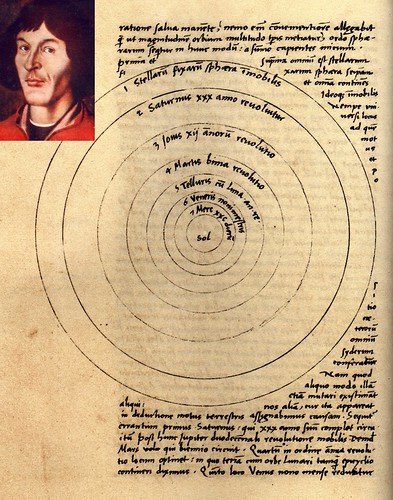Sometimes It’s Personal. Sometimes It’s Not. How Can You Tell?

Copernicus' seditiously suggests Earth is NOT the center of our solar system. Is that a twinkle in his eye?
“What’s your take on that Zoe?” friend Marsha asked me. We belong to the same CSA. She referred to a new member.
“She’s OK, I guess. Haven’t talked to her.”
“I think she’s snooty.”
“You do?”
“I smile, say hello, and get ignored. Who does she think she is?!”
“You think she’s snubbing you?” I was surprised.
“What else?”
“Come on!”
Marsha raised an eyebrow.
“When she looks down and scurries by me, I think: shy, depressed, or maybe she grew up wild in the woods, this is her first exposure to people.
Or, maybe she’s just preoccupied, thinking heavy thoughts.”
“She’s rude,” Marsha insisted.
I shrugged. “Anyone whose eyes land on mine, I greet. If they don’t greet me back, so what? I’ve been well mannered. I’ve stretched myself against my own shyness. I’ve met my own standard.”
“One brush-off, I’m done.”
“Really?!” I was astonished. “You’ll never greet Zoe again?”
“Nope.” She was astonished back. “You would?”
“Well, sure. I’m assuming she’s more insecure than I am. Plus, you know, maybe she’s just having a bad day. Or a bad year.”
I look at Marsha searchingly. “We all crave acknowledgment, don’t you think? Especially if we’re shy. In fact, your hurt reaction proves my point!”
“Hmph!”
Look at this. Same event, two utterly different reactions. And here’s the critical point: Each reaction yields its own plan of action.
Let me whip out my shrink magnifying glass for a closer look. Hmmm. I spy with my little eye two layers to Marsha’s response to Zoe.
First, she assumes that she and Zoe use the same book of social rules. One of which is: when someone greets you, you greet back. To not do so is rude. Marsha would only be rude to communicate dislike. Therefore Zoe must not like her.
Second, on a deeper level Marsha wants— no, needs to be acknowledged in order to feel validated, and good about herself. When Zoe doesn’t meet this need, Marsha feels rejected, and bad about herself.
It's unfair to get rejected for no reason. And it hurts like hell. Anger and resentment naturally follow. What does Marsha do to get even and feel better? She rejects Zoe. It’s logical. Psychic logic.
What went on in me when Zoe didn't greet me? One perk of being a shrink is this. I’ve learned we don’t all use the same book of social rules. Is Zoe impolite? Maybe. But maybe she’s visiting from Mars and doesn’t know our ways. Which has nothing to do with me.
Secondly, I need validation as much as the next person. But only from specific people important to me. Is Zoe important to me? No. She is a mere blip falling off the edge of my screen. Of course I noticed she didn’t return my greeting. In noticing, I idly wondered what was going on with her. That was it. Emotionally neutral. Sort of like hearing a faint, and unthreatening, noise somewhere in the house, wondering what could have caused it, and leaving it at that.
Marsha took what Zoe did (or didn’t do) personally. I didn’t. Mae West said: I’ve been rich and I’ve been poor. Rich is better. Likewise, I’ve taken things personally, and I’ve not taken things personally. Not taking things personally is better. Life can be very pleasant when you remove yourself from the center.
I’ve worked on this forever. Years ago, at tai chi camp, Sunday, 6:00 a.m., fellow tai-chi-er Julie and I sat across a cafeteria table, waiting silently for coffee. We had done lots (and I mean, lots) of tai chi since Friday. And gotten little sleep. I felt unpleasantly tired and fragile. If Julie— or anybody for that matter— spoke to me, I might shatter.
The first few sips were ambrosial, the rest of the cup therapeutic. Ahhhh. I felt my body relax, the fog lift and the sun come out. I smiled at Julie. She smiled back.
“Thank God for coffee,” she said. “It’s good you didn’t speak to me. I would have bitten your head off. People are so irritating before the first cup.”
I laughed. Needing caffeine made me introspective, while it focused her on others. Made me timid, her ferocious. Same event. Different experiences. Both valid.
Have you seen Rashomon (1950), directed by Akira Kurasawa? Incredible movie. A classic. (Kurasawa is famous for another masterpiece, The Seven Samurai (1956), later remade into The Magnificent Seven (1960).)
Rashomon is a crime mystery about the rape of a woman and the murder of her samurai husband. It’s told from the points of view of four witnesses: the wife, the bandit/rapist, the ghost of the murdered husband, and the narrator.
The stories are mutually contradictory, and not even the narrator’s— seemingly the most objective— is uncontaminated by factors of ego and face.
It’s a hauntingly beautiful film, deeply disturbing and densely nutritious to the soul, for it declines to explicate the “truth,” choosing instead to explore the subjective nature of reality.
From it, I learned (and continue to learn, one onion layer at a time) that:
My “truth” may not be yours. And vice-versa.
We all have filters through which we interpret our interactions with others. That’s why it pays to check in with people. If only in your mind.
Talk. Inquire. Exchange points of view. It’s the only way to build understanding, acceptance and compassion. To take yourself out of the center. To stop taking things personally.
Reality: What a concept! ROBIN WILLIAMS
PHOTO CREDIT: trois_merlettes